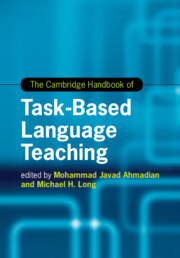Book contents
- The Cambridge Handbook of Task-Based Language Teaching
- Cambridge Handbooks In Language And Linguistics
- The Cambridge Handbook of Task-Based Language Teaching
- Copyright page
- Dedication
- Contents
- Figures
- Tables
- Contributors
- Preface The Origins and Growth of Task-Based Language Teaching
- Part I The Rationale for Task-Based Language Teaching
- Part II Tasks and Needs Analysis
- 3 Why Task? Task as a Unit of Analysis for Language Education
- 4 Adapting and Advancing Task-Based Needs Analysis Methodology across Diverse Language Learning Contexts
- 4A Developing a Task-Based Approach
- 4B A Task-Based Language Needs Analysis of Syrian Refugee Parents in Turkey
- 4C Task-Based Language Teaching in a Japanese University
- 4D The Implementation of a Task-Based Spanish-Language Program in Qingdao, China
- 5 The L in TBLT
- 5A Blustery with an Occasional Downpour
- 5B “I Have a Question”
- Part III The Task Syllabus and Materials
- Part IV Methodology and Pedagogy
- Part V Task-Based Language Teaching with School-Age Children
- Part VI The Teacher in Task-Based Language Teaching
- Part VII Task-Based Assessment and Program Evaluation
- Part VIII Research Needs and Future Prospects
- Index
- References
4 - Adapting and Advancing Task-Based Needs Analysis Methodology across Diverse Language Learning Contexts
from Part II - Tasks and Needs Analysis
Published online by Cambridge University Press: 19 November 2021
- The Cambridge Handbook of Task-Based Language Teaching
- Cambridge Handbooks In Language And Linguistics
- The Cambridge Handbook of Task-Based Language Teaching
- Copyright page
- Dedication
- Contents
- Figures
- Tables
- Contributors
- Preface The Origins and Growth of Task-Based Language Teaching
- Part I The Rationale for Task-Based Language Teaching
- Part II Tasks and Needs Analysis
- 3 Why Task? Task as a Unit of Analysis for Language Education
- 4 Adapting and Advancing Task-Based Needs Analysis Methodology across Diverse Language Learning Contexts
- 4A Developing a Task-Based Approach
- 4B A Task-Based Language Needs Analysis of Syrian Refugee Parents in Turkey
- 4C Task-Based Language Teaching in a Japanese University
- 4D The Implementation of a Task-Based Spanish-Language Program in Qingdao, China
- 5 The L in TBLT
- 5A Blustery with an Occasional Downpour
- 5B “I Have a Question”
- Part III The Task Syllabus and Materials
- Part IV Methodology and Pedagogy
- Part V Task-Based Language Teaching with School-Age Children
- Part VI The Teacher in Task-Based Language Teaching
- Part VII Task-Based Assessment and Program Evaluation
- Part VIII Research Needs and Future Prospects
- Index
- References
Summary
This chapter reviews the contextual diversity and methodological advances in task-based needs analysis (NA) as it has evolved over the last thirty years. After considering the theoretical foundations motivating task-based NA and desired methodological standards, a synthesis of task-based NA research carried out in educational and social contexts across the globe is provided. This synthesis prompts critical reflection on the need to more readily emphasize context in NA practice and to prioritize methodological flexibility and adaptability in order to maximize TBLT’s potential relevance and reach.
Keywords
Information
- Type
- Chapter
- Information
- The Cambridge Handbook of Task-Based Language Teaching , pp. 73 - 98Publisher: Cambridge University PressPrint publication year: 2021
References
Further Reading
References
Accessibility standard: Unknown
Why this information is here
This section outlines the accessibility features of this content - including support for screen readers, full keyboard navigation and high-contrast display options. This may not be relevant for you.Accessibility Information
- 1
- Cited by
